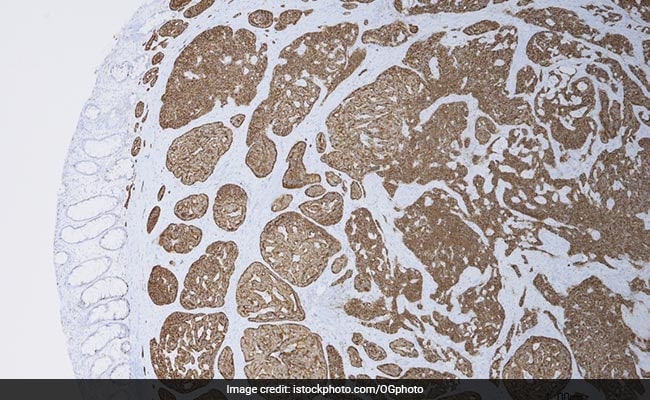Neuroendocrine Tumour is the rare disease Bollywood actor, Irrfan Khan is suffering from. He had tweeted a couple of weeks back to inform his fans that he had been diagnosed with a rare disease, which had raised many speculations about what the disease really was.

Neuroendocrine tumour: This is what Irrfan Khan is suffering from
What is neuroendocrine tumour?
Neuroendocrine tumours are basically tumors formed when abnormal growth occurs in the cells producing hormones. Despite the name - it has little to do with the brain and is not a neurological problem. Common locations are the lungs, pancreas. Common NET are pheochromocytomas, merkels tumours in the pancreas, carcinoid tumors etc. The neuroendocrine tumour begins with cells that produce hormones in the body's neuroendocrine system. The neuroendocrine system is made up of hormone producing endocrine cells as well as nerve cells. These cells are found almost throughout the body in the gastrointestinal tract including intestines and stomach, and the lungs. Neuroendocrine cells are responsible for regulating the flow of blood and air through the lungs and controlling how swiftly the food moves in the gastrointestinal tract. The type of NET depends on the location of the cancer and the symptoms which the patient goes through.
— Irrfan (@irrfank) March 16, 2018
Causes of neuroendocrine tumour
It might seem surprising but experts are still unaware of what causes neuroendocrine tumour. Some key factors could include family history, multiendocrine neoplasia type 1 and 2, Neurofibromatosis type 1 (NF1), Von Hippel-Lindau syndrome (VHL) and Tuberous sclerosis complex (TSC).
Other factors:
1. Factors like age, gender and immune system also play a role in determining if you are at risk of getting neuroendocrine tumour.
2. Men between the ages of 40-70 are at high risk of neuroendocrine tumour. Also, if you have a weak immune system because of a surgery or an organ transplant in the past, you are at a higher risk of neuroendocrine tumour.
3. Another factor that can cause neuroendocrine tumour is spending a lot of time under the sun. The ultraviolet rays of the sun can damage the DNA of skin of people who have spent a lot of time outdoors. This damage can cause an outgrowth of cells and lead to the formation of cancer.
4. Smoking can also be considered as a causative factor of neuroendocrine tumour.

Irrfan Khan's rare disease is neuroendocrine tumor
Symptoms of neuroendocrine tumour
Some common symptoms of neuroendocrine tumour include high glucose levels in the blood or hyperglycemia. Low levels of glucose in the blood or hypoglycaemia can also be a symptom of neuroendocrine tumour. Hypoglycemia can make you feel dizzy, shaky, sweaty and can even make you faint.
Diarrhoea, consistent pain in a specific area, unexplained loss of appetite or weight loss, persistent cough, thickening or development of lumps in any part of the body, unexplained changes in bowel and bladder habits, unexplained weight gain, jaundice, unusual bleeding or strange discharge, anxiety, headaches, skin rashes and nutritional deficiencies can all be symptoms of neuroendocrine disorder.
If these symptoms continue for too long or have been too frequent, you need to visit a doctor. In case you are diagnosed with neuroendocrine disorder, your relieving symptoms will play an equally important part in the process of your treatment.
Treatment for neuroendocrine tumour
Surgery, radiation therapy, chemotherapy, targeted therapy and medications are the various kinds of treatments for neuroendocrine tumour. The treatment depends on factors such as the type of tumour, if it is cancerous and (if yes) at which stage, the side effects of the treatment and the patient's overall health.
Care for symptoms and side effects of tumour treatment
Treatment for tumour can have side effects and palliative or supportive care might be required for the well-being of the patient. It helps in improving the quality of life of the patient and his/her family. The sooner palliative care is started, the better it is for the patient.
Palliative care includes medication, meeting the nutritional changes that the patient needs, various techniques of relaxation along with emotional support and therapy.
In case of metastatic neuroendrocine tumours
A metastatic tumour is the cancerous tumour which spreads to another part of the body. Treatment of metastatic neuroendocrine tumours is the same as treatment for neuroendocrine tumours. This treatment too is followed by palliative care for the well-being of the patient.
However, diagnosis of metastatic tumours is quite stressful and might have an emotional impact on the patient.
In case the treatment fails
Recovering from neuroendocrine tumours might not always be possible. In case the tumour is advanced or terminal, it fails to be controlled or cured.
Some patients suffering from advanced neuroendocrine tumours might not have a life of more than 6 months. Palliative or hospice care - which provides the best quality of life to the patient - might be required. Nursing care with special equipments can be done at home, as per the desire of the patient and his/her
Our best wishes are with Irrfan Khan and we hope he gets well soon!
Disclaimer: This content including advice provides generic information only. It is in no way a substitute for qualified medical opinion. Always consult a specialist or your own doctor for more information. NDTV does not claim responsibility for this information.
DoctorNDTV is the one stop site for all your health needs providing the most credible health information, health news and tips with expert advice on healthy living, diet plans, informative videos etc. You can get the most relevant and accurate info you need about health problems like diabetes, cancer, pregnancy, HIV and AIDS, weight loss and many other lifestyle diseases. We have a panel of over 350 experts who help us develop content by giving their valuable inputs and bringing to us the latest in the world of healthcare.














